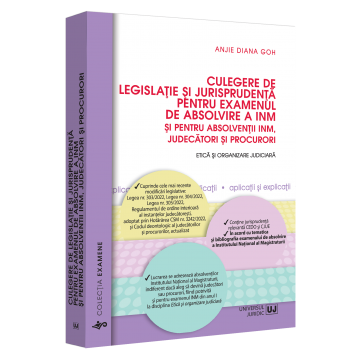Manuscript proposals: [email protected] / 0745 204 115 //// Tracking orders Individuals / Sales: 0745 200 357 / Orders Legal entities: 0721 722 783
6359.png) Assignment of the contract in the process of standardizing the law at European level - Diana-Nicoleta Deaconu-Dascalu
Assignment of the contract in the process of standardizing the law at European level - Diana-Nicoleta Deaconu-Dascalu
6359.png)
ISBN: 978-606-28-0307-0
DOI: 10.5682/9786062803070
Publisher year: 2015
Edition: I
Pages: 292
Publisher: Editura Universitară
Author: Diana-Nicoleta Deaconu-Dascalu
Product Code:
9786062803070
Do you need help?
0745 200 357
- Description
- Download (1)
- Authors
- Content
- More details
- Reviews (0)
Although the assignment of a contract has long been a controversial legal figure in terms of legislative recognition, legal doctrine and practice has often witnessed the possibility of assigning a contract. Legal science, recognizing the economic and social reality that sees in the assignment, not least, an instrument of circulation of essential values, has been forced towards maturity, reaching to admit that an obligatory report is seen as a transferable good, so it can be ceded like any other tangible good.
The national legislator, following the model of the civil codes used as inspiration and under the impact of the projects of uniformity of the European law, accepted the legislative regulation of a distinct legal figure, new in the Romanian law, respectively the assignment of contract, thus offering an appropriate legal basis for operations. they were already performing in practice (ex: leasing takeovers), but in case they resorted to other legal figures (for example the assignment of debt, the novation by change of debtor) which did not fully satisfy the needs of the co-contractors. Thus, the Civil Code of 2009 no longer avoids this new way of transmitting obligations, which is already gaining ground in the civil reality, but especially in the commercial one, and is expressly embraced in art. 1315-1320 the institution of the assignment of the contract. Its entry into force in October 2011 marks the moment when both the legislation and the jurisprudence and doctrine come to recognize, without hypocrisy, the vitality of the assignment, be it debt, debt or contract.
As specified in the doctrine1, the assignment of a contract (referred to by a part of the doctrine, as well as by certain foreign legislations, and "assignment of contractual position") involves the intervention of three parties: the assignor (the party who assigns his contractual position), the assignee (the third party which, as an effect of the agreement concluded with the assignor, takes its place in the contractual legal relationship) and the assignee (the initial contractual part, against which the effects of the assignment of the contract will also occur).
A. I. Danila, Contract assignment, Hamangiu Publishing House, Bucharest, 2010.
The explanation for such an operation consists in the fact that, when the parties do not want the contract to be terminated between them, but its survival and a third party willing to take the place of the party leaving the contract appears, the contract assignment operation can be used for a continuation of contractual relations with the newcomer.
Why resort to the intervention of this institution and not to a novation by changing creditor or debtor, an institution much older and unanimously accepted by legal doctrine? The answer is as simple as possible if we consider the effect of such an institution. Novation is known as a way to extinguish the old obligation followed by its replacement with a new one, which necessarily includes a new liquid, a new element. If novation were used for one of the parties to a contractual relationship to be replaced by a third party, the consequences would be disastrous, given the main effect of this institution, namely the extinction of the old obligation with all its accessories and guarantees.
However, the legitimate question is: can an agreement of will between two parties be transferred to a third party to replace one of them? We consider that it is a pertinent question as long as, indeed, the contract is classically defined as an agreement of wills.
According to the provisions of art. 1315 of the new Civil Code "a party may substitute a third party in the relations arising from a contract only if the services have not yet been fully performed, and the other party agrees to it."
To this question, the answer given in the doctrine2 was a nuanced one - the agreement of wills was not transmitted because the agreement of wills must be reiterated, but only the contractual position of the assignor was transmitted. The name given to the French doctrine, that of "contractual position" allows the analysis of situations in which, unlike a debt assignment, a debt assignment, a novation or a traditional delegation, is transmitted to the assignee the full rights and obligations of the party that withdraws, viewed as a whole, not as isolated rights and debts, together with the guarantees constituted, with the recognized optional rights, etc.
The proposed research topic aims to analyze the vision of the contemporary legislator in the field of contract assignment in the context in which at European level important steps are taken to unify the private law of the Member States of the European Union.
The assignment of the contract represents an absolutely new legal figure in the Romanian law, together with the taking over of the debt, preceded legislatively by the assignment of the debt, as an already established means of transmitting the obligations.
The extensive field of research thus imprints a character of interdisciplinarity, being treated not only aspects that are found in civil law, comparative law, but also community law.
Among the elements of novelty and originality that we intend to bring through the researched topic are:
- providing a framework image regarding the trinomial contract assignment-assignment of receivable-assignment of debt;
- their separate, systematized and coherent analysis depending on the internal and European regulatory sources;
- following their evolution and the legislator's vision, respectively capturing the continuity-novelty relationship in the matter of the means of transmitting the obligations;
- the impact of the economic element on the nature of the contract - the creation of the contract theory as an economic good and its consequences on the civil circuit and of the legal relations between the holders of debt rights,
- the evolutionary and comparative analysis of the assignment of the contract, of the assignment of the receivable and of the assignment of the debt in the domestic law and in the European law.
Product compliance information
The national legislator, following the model of the civil codes used as inspiration and under the impact of the projects of uniformity of the European law, accepted the legislative regulation of a distinct legal figure, new in the Romanian law, respectively the assignment of contract, thus offering an appropriate legal basis for operations. they were already performing in practice (ex: leasing takeovers), but in case they resorted to other legal figures (for example the assignment of debt, the novation by change of debtor) which did not fully satisfy the needs of the co-contractors. Thus, the Civil Code of 2009 no longer avoids this new way of transmitting obligations, which is already gaining ground in the civil reality, but especially in the commercial one, and is expressly embraced in art. 1315-1320 the institution of the assignment of the contract. Its entry into force in October 2011 marks the moment when both the legislation and the jurisprudence and doctrine come to recognize, without hypocrisy, the vitality of the assignment, be it debt, debt or contract.
As specified in the doctrine1, the assignment of a contract (referred to by a part of the doctrine, as well as by certain foreign legislations, and "assignment of contractual position") involves the intervention of three parties: the assignor (the party who assigns his contractual position), the assignee (the third party which, as an effect of the agreement concluded with the assignor, takes its place in the contractual legal relationship) and the assignee (the initial contractual part, against which the effects of the assignment of the contract will also occur).
A. I. Danila, Contract assignment, Hamangiu Publishing House, Bucharest, 2010.
The explanation for such an operation consists in the fact that, when the parties do not want the contract to be terminated between them, but its survival and a third party willing to take the place of the party leaving the contract appears, the contract assignment operation can be used for a continuation of contractual relations with the newcomer.
Why resort to the intervention of this institution and not to a novation by changing creditor or debtor, an institution much older and unanimously accepted by legal doctrine? The answer is as simple as possible if we consider the effect of such an institution. Novation is known as a way to extinguish the old obligation followed by its replacement with a new one, which necessarily includes a new liquid, a new element. If novation were used for one of the parties to a contractual relationship to be replaced by a third party, the consequences would be disastrous, given the main effect of this institution, namely the extinction of the old obligation with all its accessories and guarantees.
However, the legitimate question is: can an agreement of will between two parties be transferred to a third party to replace one of them? We consider that it is a pertinent question as long as, indeed, the contract is classically defined as an agreement of wills.
According to the provisions of art. 1315 of the new Civil Code "a party may substitute a third party in the relations arising from a contract only if the services have not yet been fully performed, and the other party agrees to it."
To this question, the answer given in the doctrine2 was a nuanced one - the agreement of wills was not transmitted because the agreement of wills must be reiterated, but only the contractual position of the assignor was transmitted. The name given to the French doctrine, that of "contractual position" allows the analysis of situations in which, unlike a debt assignment, a debt assignment, a novation or a traditional delegation, is transmitted to the assignee the full rights and obligations of the party that withdraws, viewed as a whole, not as isolated rights and debts, together with the guarantees constituted, with the recognized optional rights, etc.
The proposed research topic aims to analyze the vision of the contemporary legislator in the field of contract assignment in the context in which at European level important steps are taken to unify the private law of the Member States of the European Union.
The assignment of the contract represents an absolutely new legal figure in the Romanian law, together with the taking over of the debt, preceded legislatively by the assignment of the debt, as an already established means of transmitting the obligations.
The extensive field of research thus imprints a character of interdisciplinarity, being treated not only aspects that are found in civil law, comparative law, but also community law.
Among the elements of novelty and originality that we intend to bring through the researched topic are:
- providing a framework image regarding the trinomial contract assignment-assignment of receivable-assignment of debt;
- their separate, systematized and coherent analysis depending on the internal and European regulatory sources;
- following their evolution and the legislator's vision, respectively capturing the continuity-novelty relationship in the matter of the means of transmitting the obligations;
- the impact of the economic element on the nature of the contract - the creation of the contract theory as an economic good and its consequences on the civil circuit and of the legal relations between the holders of debt rights,
- the evolutionary and comparative analysis of the assignment of the contract, of the assignment of the receivable and of the assignment of the debt in the domestic law and in the European law.
-
Assignment of the contract in the process of standardizing the law at European level
Download
Diana-Nicoleta Deaconu-Dascalu
Content
Argumentum / 9
List of abbreviations / 13
CHAPTER 1. ASSIGNMENT OF CONTRACT - INSTRUMENT
OF OBLIGATIONAL DYNAMISM / 15
Section 1. Assignment of contract - a new legal phenomenon in the category of means of transfer of obligations / 15
Introductory aspects regarding the dynamics of obligations / 15
Assignment of contract - a new means of transferring obligations / 18
Section 2. Similarities and differences between the assignment of the contract and the other means of transmission and transformation of obligations / 20
Introductory considerations / 20
Assignment of receivable / 21
Subrogation in the creditor's rights by paying the debt / 24
Taking over the debt / 29
Novatia / 35
Section 3. General analysis of the trinoma assignment of receivables - assignment of debt-assignment of contract / 38
Assignment of receivable / 39
Legal headquarters / 39
Definition of debt assignment / 39
Scope of assignment of debt / 39
Conditions of validity of the assignment / 41
The effects of the assignment of the debt / 43
Assignment of contract in European coding projects / 48
Draft European Code of Contracts / 48
Draft principles of European contract law / 52
UNIDROIT principles / 54
Debt settlement - a new means of transferring obligations. 56 3.2.1. Preliminary aspects / 56
The notion, the legal nature and the headquarters of the matter in case of taking over the debt / 59
Scope of debt collection / 62
Ways to take over the debt / 64
The effects of debt collection / 69
Effects of debt assignment / 70
The effects of taking over the debt in the
between the creditor and the new debtor / 76
Ineffectiveness of debt collection / 78
Regulation of the transmission of the passive side of the obligatory report in the vision of the projects of unification of the legislation at European level / 79
Draft European Code of Contracts / 81
Draft principles of European contract law / 86
Unidroit Principles / 89
Section 4. Historical premises of the contract assignment / 94
About the transmission of obligations in Romanian law / 94
About the assignment from the Middle Ages to the present / 98
CHAPTER 2. ASSIGNMENT OF CONTRACT - EXPRESSION OF CONTRACTUAL FREEDOM IN COMPARATIVE LAW / 101
Section 1. Introductory aspects. / 101
Section 2. Assignment of contract in various legislations belonging to the continental legal system / 102
Italian Civil Code / 102
French law / 107
Quebec legislation / 109
Spanish law / 110
Portuguese law / 113
Assignment of contract in Arab legislation / 115
Section 3. Assignment of contract in the common law system / 117
CHAPTER 3. ASSIGNMENT OF CONTRACT IN PROJECTS
UNIFICATION OF LAW AT EUROPEAN LEVEL / 124
Section 1. Evolutionary aspects regarding the approach of adopting a
European Civil Code / 124
Section 2. Principles / UNIDROIT / drafted / under the auspices of the International Institute for the Unification of Private Law / 136
Section 3. Draft principles of European contract law 142
Section 4. Draft European Code of Contracts / 143
CHAPTER 4. ASSIGNMENT OF A CONTRACT IN THE VIEW OF THE NATIONAL LEGISLATOR / 157
Section 1. The institution of the contract between the subjectivist prejudice
and objectivist modernism / 157
Section 2. Legal challenges in the matter of contract assignment / 166
Introductory aspects regarding the principle of the obligatory force of the contract in the regulation of the new Romanian Civil Code / 166
The principle of the binding force of the contract in the matter of assignment
of contract / 168
Section 3. Legal headquarters of the contract assignment / 175
Section 4. Definition of contract assignment / 176
Section 5. Analysis of the main theories regarding the legal nature of the contract assignment / 179
Section 6. Types of contract assignment / 183
Section 7. Conditions of validity and effectiveness of the contract assignment / 189
General presentation of the conditions of the contract assignment / 189
Scope of contract assignment / 191
Preliminary considerations regarding the field of action of the contract assignment / 191
Scope of contract assignment / 192
Hypostases of the consent of the assigned party within the contract assignment / 198
Considerations / preliminary / regarding / the consent of the assignee within the conventional contract assignment / 198
The role of informing the assigned party in the contract assignment process / 202
Refusal of the assigned party to consent to the substitution of the assignor within the contract assignment / 208
Form of assignment / 218
Section 8. Effects of contract assignment / 219
Preliminary considerations / 219
Legal relations between the assignor and the assigned party / 221
Legal relations between assignee and assignee / 227
Legal relations between assignor and assignee / 229
CHAPTER 5. APPLICATIONS OF THE ASSIGNMENT OF CONTRACT IN VARIOUS TYPES OF CONTRACTS / 234
Section 1. Assignment of the lease / 234
Premises in the analysis of the assignment of the lease contract / 234
Specific rules on the conventional assignment of the lease / 235
Legal assignment of conrental tract / 241
Section 2. Assignment of the leasing contract / 245
Introductory notions regarding the leasing contract / 246
Assignment of the leasing contract in legal practice prior to the new Civil Code / 247
Assignment of the leasing contract after the entry into force of the Civil Code / 250
Conditions regarding the assignment of the leasing contract / 250
The effects of the leasing assignment / 252
Section 3. Assignment of the concession contract / 253
Administrative contracts - object of the contract assignment / 253
Assignment of the concession contract / 255
Section 4. Assignment of the franchise contract / 262
Section 5. Assignment of the individual employment contract / 268
Transfer of the enterprise - case of legal assignment of contract / 268
Detachment - the hypothesis of the legal assignment of the contract / 274
Bibliography / 280
Argumentum / 9
List of abbreviations / 13
CHAPTER 1. ASSIGNMENT OF CONTRACT - INSTRUMENT
OF OBLIGATIONAL DYNAMISM / 15
Section 1. Assignment of contract - a new legal phenomenon in the category of means of transfer of obligations / 15
Introductory aspects regarding the dynamics of obligations / 15
Assignment of contract - a new means of transferring obligations / 18
Section 2. Similarities and differences between the assignment of the contract and the other means of transmission and transformation of obligations / 20
Introductory considerations / 20
Assignment of receivable / 21
Subrogation in the creditor's rights by paying the debt / 24
Taking over the debt / 29
Novatia / 35
Section 3. General analysis of the trinoma assignment of receivables - assignment of debt-assignment of contract / 38
Assignment of receivable / 39
Legal headquarters / 39
Definition of debt assignment / 39
Scope of assignment of debt / 39
Conditions of validity of the assignment / 41
The effects of the assignment of the debt / 43
Assignment of contract in European coding projects / 48
Draft European Code of Contracts / 48
Draft principles of European contract law / 52
UNIDROIT principles / 54
Debt settlement - a new means of transferring obligations. 56 3.2.1. Preliminary aspects / 56
The notion, the legal nature and the headquarters of the matter in case of taking over the debt / 59
Scope of debt collection / 62
Ways to take over the debt / 64
The effects of debt collection / 69
Effects of debt assignment / 70
The effects of taking over the debt in the
between the creditor and the new debtor / 76
Ineffectiveness of debt collection / 78
Regulation of the transmission of the passive side of the obligatory report in the vision of the projects of unification of the legislation at European level / 79
Draft European Code of Contracts / 81
Draft principles of European contract law / 86
Unidroit Principles / 89
Section 4. Historical premises of the contract assignment / 94
About the transmission of obligations in Romanian law / 94
About the assignment from the Middle Ages to the present / 98
CHAPTER 2. ASSIGNMENT OF CONTRACT - EXPRESSION OF CONTRACTUAL FREEDOM IN COMPARATIVE LAW / 101
Section 1. Introductory aspects. / 101
Section 2. Assignment of contract in various legislations belonging to the continental legal system / 102
Italian Civil Code / 102
French law / 107
Quebec legislation / 109
Spanish law / 110
Portuguese law / 113
Assignment of contract in Arab legislation / 115
Section 3. Assignment of contract in the common law system / 117
CHAPTER 3. ASSIGNMENT OF CONTRACT IN PROJECTS
UNIFICATION OF LAW AT EUROPEAN LEVEL / 124
Section 1. Evolutionary aspects regarding the approach of adopting a
European Civil Code / 124
Section 2. Principles / UNIDROIT / drafted / under the auspices of the International Institute for the Unification of Private Law / 136
Section 3. Draft principles of European contract law 142
Section 4. Draft European Code of Contracts / 143
CHAPTER 4. ASSIGNMENT OF A CONTRACT IN THE VIEW OF THE NATIONAL LEGISLATOR / 157
Section 1. The institution of the contract between the subjectivist prejudice
and objectivist modernism / 157
Section 2. Legal challenges in the matter of contract assignment / 166
Introductory aspects regarding the principle of the obligatory force of the contract in the regulation of the new Romanian Civil Code / 166
The principle of the binding force of the contract in the matter of assignment
of contract / 168
Section 3. Legal headquarters of the contract assignment / 175
Section 4. Definition of contract assignment / 176
Section 5. Analysis of the main theories regarding the legal nature of the contract assignment / 179
Section 6. Types of contract assignment / 183
Section 7. Conditions of validity and effectiveness of the contract assignment / 189
General presentation of the conditions of the contract assignment / 189
Scope of contract assignment / 191
Preliminary considerations regarding the field of action of the contract assignment / 191
Scope of contract assignment / 192
Hypostases of the consent of the assigned party within the contract assignment / 198
Considerations / preliminary / regarding / the consent of the assignee within the conventional contract assignment / 198
The role of informing the assigned party in the contract assignment process / 202
Refusal of the assigned party to consent to the substitution of the assignor within the contract assignment / 208
Form of assignment / 218
Section 8. Effects of contract assignment / 219
Preliminary considerations / 219
Legal relations between the assignor and the assigned party / 221
Legal relations between assignee and assignee / 227
Legal relations between assignor and assignee / 229
CHAPTER 5. APPLICATIONS OF THE ASSIGNMENT OF CONTRACT IN VARIOUS TYPES OF CONTRACTS / 234
Section 1. Assignment of the lease / 234
Premises in the analysis of the assignment of the lease contract / 234
Specific rules on the conventional assignment of the lease / 235
Legal assignment of conrental tract / 241
Section 2. Assignment of the leasing contract / 245
Introductory notions regarding the leasing contract / 246
Assignment of the leasing contract in legal practice prior to the new Civil Code / 247
Assignment of the leasing contract after the entry into force of the Civil Code / 250
Conditions regarding the assignment of the leasing contract / 250
The effects of the leasing assignment / 252
Section 3. Assignment of the concession contract / 253
Administrative contracts - object of the contract assignment / 253
Assignment of the concession contract / 255
Section 4. Assignment of the franchise contract / 262
Section 5. Assignment of the individual employment contract / 268
Transfer of the enterprise - case of legal assignment of contract / 268
Detachment - the hypothesis of the legal assignment of the contract / 274
Bibliography / 280
Although the assignment of a contract has long been a controversial legal figure in terms of legislative recognition, legal doctrine and practice has often witnessed the possibility of assigning a contract. Legal science, recognizing the economic and social reality that sees in the assignment, not least, an instrument of circulation of essential values, has been forced towards maturity, reaching to admit that an obligatory report is seen as a transferable good, so it can be ceded like any other tangible good.
The national legislator, following the model of the civil codes used as inspiration and under the impact of the projects of uniformity of the European law, accepted the legislative regulation of a distinct legal figure, new in the Romanian law, respectively the assignment of contract, thus offering an appropriate legal basis for operations. they were already performing in practice (ex: leasing takeovers), but in case they resorted to other legal figures (for example the assignment of debt, the novation by change of debtor) which did not fully satisfy the needs of the co-contractors. Thus, the Civil Code of 2009 no longer avoids this new way of transmitting obligations, which is already gaining ground in the civil reality, but especially in the commercial one, and is expressly embraced in art. 1315-1320 the institution of the assignment of the contract. Its entry into force in October 2011 marks the moment when both the legislation and the jurisprudence and doctrine come to recognize, without hypocrisy, the vitality of the assignment, be it debt, debt or contract.
As specified in the doctrine1, the assignment of a contract (referred to by a part of the doctrine, as well as by certain foreign legislations, and "assignment of contractual position") involves the intervention of three parties: the assignor (the party who assigns his contractual position), the assignee (the third party which, as an effect of the agreement concluded with the assignor, takes its place in the contractual legal relationship) and the assignee (the initial contractual part, against which the effects of the assignment of the contract will also occur).
A. I. Danila, Contract assignment, Hamangiu Publishing House, Bucharest, 2010.
The explanation for such an operation consists in the fact that, when the parties do not want the contract to be terminated between them, but its survival and a third party willing to take the place of the party leaving the contract appears, the contract assignment operation can be used for a continuation of contractual relations with the newcomer.
Why resort to the intervention of this institution and not to a novation by changing creditor or debtor, an institution much older and unanimously accepted by legal doctrine? The answer is as simple as possible if we consider the effect of such an institution. Novation is known as a way to extinguish the old obligation followed by its replacement with a new one, which necessarily includes a new liquid, a new element. If novation were used for one of the parties to a contractual relationship to be replaced by a third party, the consequences would be disastrous, given the main effect of this institution, namely the extinction of the old obligation with all its accessories and guarantees.
However, the legitimate question is: can an agreement of will between two parties be transferred to a third party to replace one of them? We consider that it is a pertinent question as long as, indeed, the contract is classically defined as an agreement of wills.
According to the provisions of art. 1315 of the new Civil Code "a party may substitute a third party in the relations arising from a contract only if the services have not yet been fully performed, and the other party agrees to it."
To this question, the answer given in the doctrine2 was a nuanced one - the agreement of wills was not transmitted because the agreement of wills must be reiterated, but only the contractual position of the assignor was transmitted. The name given to the French doctrine, that of "contractual position" allows the analysis of situations in which, unlike a debt assignment, a debt assignment, a novation or a traditional delegation, is transmitted to the assignee the full rights and obligations of the party that withdraws, viewed as a whole, not as isolated rights and debts, together with the guarantees constituted, with the recognized optional rights, etc.
The proposed research topic aims to analyze the vision of the contemporary legislator in the field of contract assignment in the context in which at European level important steps are taken to unify the private law of the Member States of the European Union.
The assignment of the contract represents an absolutely new legal figure in the Romanian law, together with the taking over of the debt, preceded legislatively by the assignment of the debt, as an already established means of transmitting the obligations.
The extensive field of research thus imprints a character of interdisciplinarity, being treated not only aspects that are found in civil law, comparative law, but also community law.
Among the elements of novelty and originality that we intend to bring through the researched topic are:
- providing a framework image regarding the trinomial contract assignment-assignment of receivable-assignment of debt;
- their separate, systematized and coherent analysis depending on the internal and European regulatory sources;
- following their evolution and the legislator's vision, respectively capturing the continuity-novelty relationship in the matter of the means of transmitting the obligations;
- the impact of the economic element on the nature of the contract - the creation of the contract theory as an economic good and its consequences on the civil circuit and of the legal relations between the holders of debt rights,
- the evolutionary and comparative analysis of the assignment of the contract, of the assignment of the receivable and of the assignment of the debt in the domestic law and in the European law.
The national legislator, following the model of the civil codes used as inspiration and under the impact of the projects of uniformity of the European law, accepted the legislative regulation of a distinct legal figure, new in the Romanian law, respectively the assignment of contract, thus offering an appropriate legal basis for operations. they were already performing in practice (ex: leasing takeovers), but in case they resorted to other legal figures (for example the assignment of debt, the novation by change of debtor) which did not fully satisfy the needs of the co-contractors. Thus, the Civil Code of 2009 no longer avoids this new way of transmitting obligations, which is already gaining ground in the civil reality, but especially in the commercial one, and is expressly embraced in art. 1315-1320 the institution of the assignment of the contract. Its entry into force in October 2011 marks the moment when both the legislation and the jurisprudence and doctrine come to recognize, without hypocrisy, the vitality of the assignment, be it debt, debt or contract.
As specified in the doctrine1, the assignment of a contract (referred to by a part of the doctrine, as well as by certain foreign legislations, and "assignment of contractual position") involves the intervention of three parties: the assignor (the party who assigns his contractual position), the assignee (the third party which, as an effect of the agreement concluded with the assignor, takes its place in the contractual legal relationship) and the assignee (the initial contractual part, against which the effects of the assignment of the contract will also occur).
A. I. Danila, Contract assignment, Hamangiu Publishing House, Bucharest, 2010.
The explanation for such an operation consists in the fact that, when the parties do not want the contract to be terminated between them, but its survival and a third party willing to take the place of the party leaving the contract appears, the contract assignment operation can be used for a continuation of contractual relations with the newcomer.
Why resort to the intervention of this institution and not to a novation by changing creditor or debtor, an institution much older and unanimously accepted by legal doctrine? The answer is as simple as possible if we consider the effect of such an institution. Novation is known as a way to extinguish the old obligation followed by its replacement with a new one, which necessarily includes a new liquid, a new element. If novation were used for one of the parties to a contractual relationship to be replaced by a third party, the consequences would be disastrous, given the main effect of this institution, namely the extinction of the old obligation with all its accessories and guarantees.
However, the legitimate question is: can an agreement of will between two parties be transferred to a third party to replace one of them? We consider that it is a pertinent question as long as, indeed, the contract is classically defined as an agreement of wills.
According to the provisions of art. 1315 of the new Civil Code "a party may substitute a third party in the relations arising from a contract only if the services have not yet been fully performed, and the other party agrees to it."
To this question, the answer given in the doctrine2 was a nuanced one - the agreement of wills was not transmitted because the agreement of wills must be reiterated, but only the contractual position of the assignor was transmitted. The name given to the French doctrine, that of "contractual position" allows the analysis of situations in which, unlike a debt assignment, a debt assignment, a novation or a traditional delegation, is transmitted to the assignee the full rights and obligations of the party that withdraws, viewed as a whole, not as isolated rights and debts, together with the guarantees constituted, with the recognized optional rights, etc.
The proposed research topic aims to analyze the vision of the contemporary legislator in the field of contract assignment in the context in which at European level important steps are taken to unify the private law of the Member States of the European Union.
The assignment of the contract represents an absolutely new legal figure in the Romanian law, together with the taking over of the debt, preceded legislatively by the assignment of the debt, as an already established means of transmitting the obligations.
The extensive field of research thus imprints a character of interdisciplinarity, being treated not only aspects that are found in civil law, comparative law, but also community law.
Among the elements of novelty and originality that we intend to bring through the researched topic are:
- providing a framework image regarding the trinomial contract assignment-assignment of receivable-assignment of debt;
- their separate, systematized and coherent analysis depending on the internal and European regulatory sources;
- following their evolution and the legislator's vision, respectively capturing the continuity-novelty relationship in the matter of the means of transmitting the obligations;
- the impact of the economic element on the nature of the contract - the creation of the contract theory as an economic good and its consequences on the civil circuit and of the legal relations between the holders of debt rights,
- the evolutionary and comparative analysis of the assignment of the contract, of the assignment of the receivable and of the assignment of the debt in the domestic law and in the European law.
If you want to express your opinion about this product you can add a review.
write a review

![Assignment of the contract in the process of standardizing the law at European level - Diana-Nicoleta Deaconu-Dascalu [1] Assignment of the contract in the process of standardizing the law at European level - Diana-Nicoleta Deaconu-Dascalu [1]](https://gomagcdn.ro/domains/editurauniversitara.ro/files/product/large/cesiunea-de-contract-in-procesul-uniformizarii-dreptului-la-nivel-european-701-516019.jpg)














